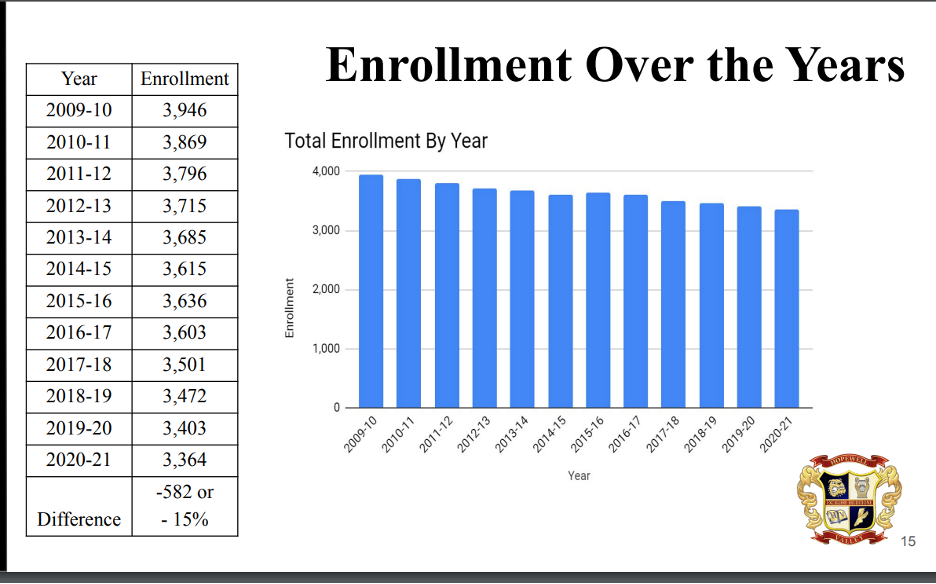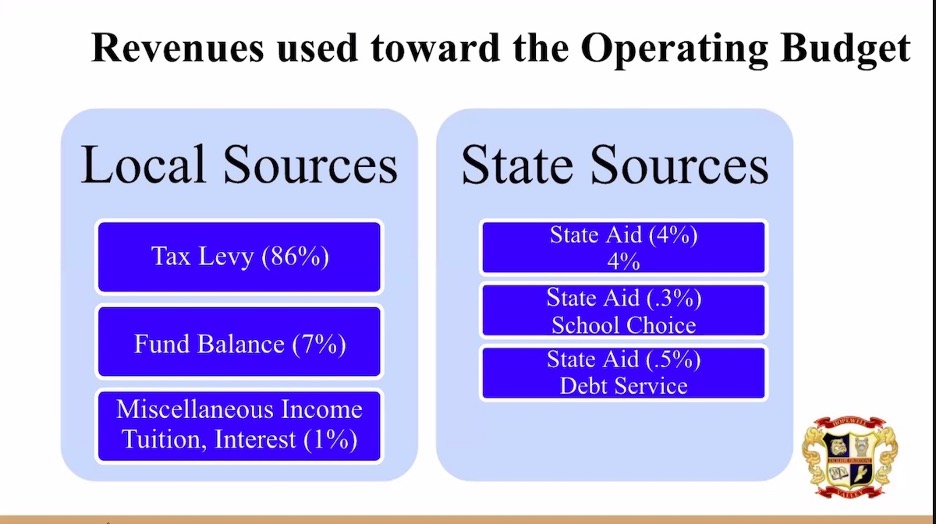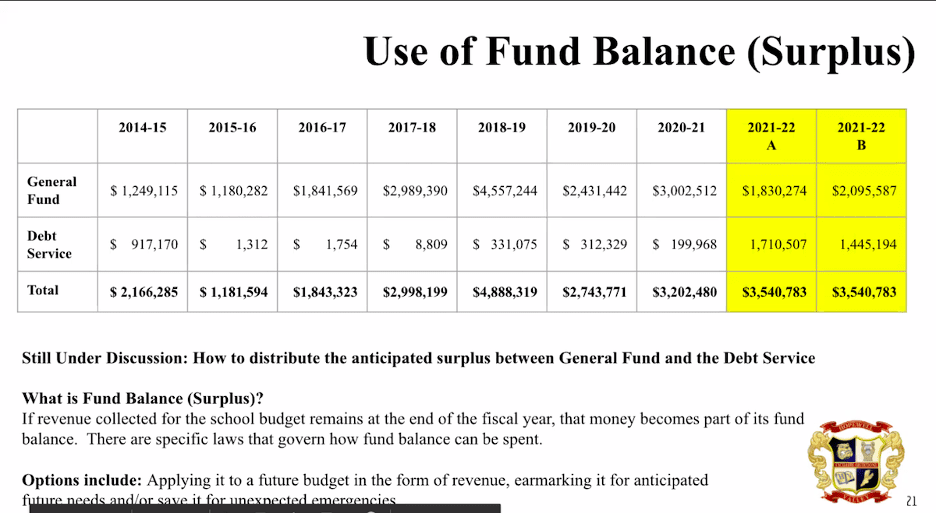The Hopewell Valley Regional District (HVRSD) School Board met with local municipal officials to discuss its budget Monday night. The full board, superintendent, and several administrators were joined by the entire Hopewell Township Committee and the Township’s acting administrator, Pennington’s mayor and administrator, and several members of the Hopewell Borough Council.*
Superintendent Tom Smith explained that pre-COVID, he would appear at municipal meetings to explain what the Board was leaning toward in terms of the next year’s budget, but that they thought it would be easier this year to invite all the municipal officials to hear it all at once. The school budget is the lion’s share of each resident’s tax bill and therefore of great concern to all the municipal leaders.
Smith emphasized that, though the budget has been in process since the summer, what they would be presenting was “a draft of a draft of a draft.” The official preliminary budget will be presented at a regular School Board meeting next Monday. The public will have six weeks to provide input to the Board, which can adjust the numbers as appropriate until the final budget is voted on April 26.
Smith presented a series of slides describing the high quality of the District. He also indicated that the District has a declining enrollment and further reduced costs this year, due to COVID in that there have been much less utilization of transportation and facilities.

However, Smith said that COVID also creates a host of uncertainties for the future.

Robert Colavita, the District’s superintendent for business then presented the proposed 2021/2022 budget:

In a follow up email to MercerMe, Colavita explained why the “Where We Stand Today” chart differs from a substantially similar chart presented at the February 22, 2021 regular Board meeting in the one category of Regular Instruction. This chart shows proposed 2021-22 spending for Regular Instruction $344,474 more than the one presented two weeks ago. Colavita said that is because the District received unanticipated state aid in that amount and decided to put it into spending, in case it was needed later.
“It was the administrative recommendation to budget that money for the possibility of having to provide programs for learning loss remediation due to covid. We are also awaiting the final transportation report that will assist the subsequent recommendation of the school start time committee which could require additional funds to support transportation. This money was placed in the regular education lines as a place holder since we don’t have specifics at this time,” Colavita wrote.


Hopewell Township Committee member Kevin Kuchinski said he was grateful to the Board for inviting them to the budget presentation. He then questioned the distribution of the tax levy in that it raises Hopewell Township taxes to what Colavita had noted would be approximately an average of $212 per property owner for the year but for Pennington not at all. Kuchinski noted that “the challenge we are all facing is that we are living in unprecedented times,” and recognized the struggle small businesses and residents in the Valley have had in the past year, asking “whether there is anything else, in the year of COVID, we could do to put less of a burden on taxpayers, both businesses and homeowners, while supporting the excellence that the [HVRSD] team has delivered for so many years.”
Colavita explained that the burden on individual taxpayers in Hopewell Township has increased because the Township lost large ratables, such as BMS.
Colavita also indicated that it is the policy of the District to keep putting money in reserve in case it might be needed. He said the District has collected so much more in taxes than needed in recent years they have paid down their debt a full year in advance and the District still has enough money to fund an additional $2 million to reserve.
Two scenarios were presented for the surplus produced in the 2021/22 budget:

Kuchinski said that he favors Option B because it is less burden on the taxpayers this year. “Can we take a break for a year in building up the capital reserve?” he asked. “Can we give our residents a hiatus? A four-cent increase is still a four-cent increase.”
Hopewell Borough Council member Debra Stuhler said she agreed with Kuchinski in appreciating the opportunity to meet with the Board and also in concern for residents. “We have a huge number of community members using food banks and really suffering – people are having trouble paying their mortgage and feeding their kids.”
Hopewell Borough Council member Ryan Kennedy also concurred saying that he also is concerned that by spending as much as the District is allowed by law to spend, regardless of whether it is really necessary, the total budget then increases every year and the burden on taxpayers is compounded.
Hopewell Township Mayor Julie Blake also agreed saying “this is one of the hardest years I’ve ever experienced as an educator and in the Township.” She then addressed School Board member Adam Sawicki, noting that he has served on the Board for a long time and has a great deal of experience with school budgets, asking him his opinion about the proposed budget.
Unfortunately, the Zoom sound cut out for most of Sawicki’s response, so MercerMe followed up to ask him what he said. His email response was:
“Essentially the committee agrees that the District shouldn’t increase the tax burden on residents this coming year. We are able to do this using surplus generated this school year. Where we were unable to come to consensus is in how to best use that surplus. In some ways, this results from a philosophical difference of opinion. Some [Board] members believe we should grow the budget near the 2% cap each year (Plan A) as a hedge against future expenses. Others believe we should base budget growth upon what the District actually needs in a given year, so that budget growth better matches expense growth (Plan B) which is less than 1% this year.
“I advocated for Plan B for the following reasons:
“– It offers the possibility of greater future tax relief because of the drop in debt service next year.
– It would use some of the additional $300K the District received in state aid this year to reduce local taxes.
– It hedges against future expense growth through the option to use “banked cap”.
– Given that the District’s finances are in good shape and we have nearly $6.4 million in capital reserve, if we can’t keep budget growth lower than 2% this year when can we?”*
The meeting ended promptly after one hour with Board President Deborah Linthorst thanking everyone for their participation.
*edited 3/11/21 at 9:18pm to correct identification of the Borough Administrator.
*edited 3/12/21 at 1:35pm to clarify that Mr. Sawicki stated in his email to MercerMe: “I want to make it clear in this response I am speaking for myself, and my statements are not intended to represent a statement by the Board.”




